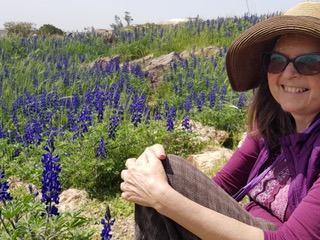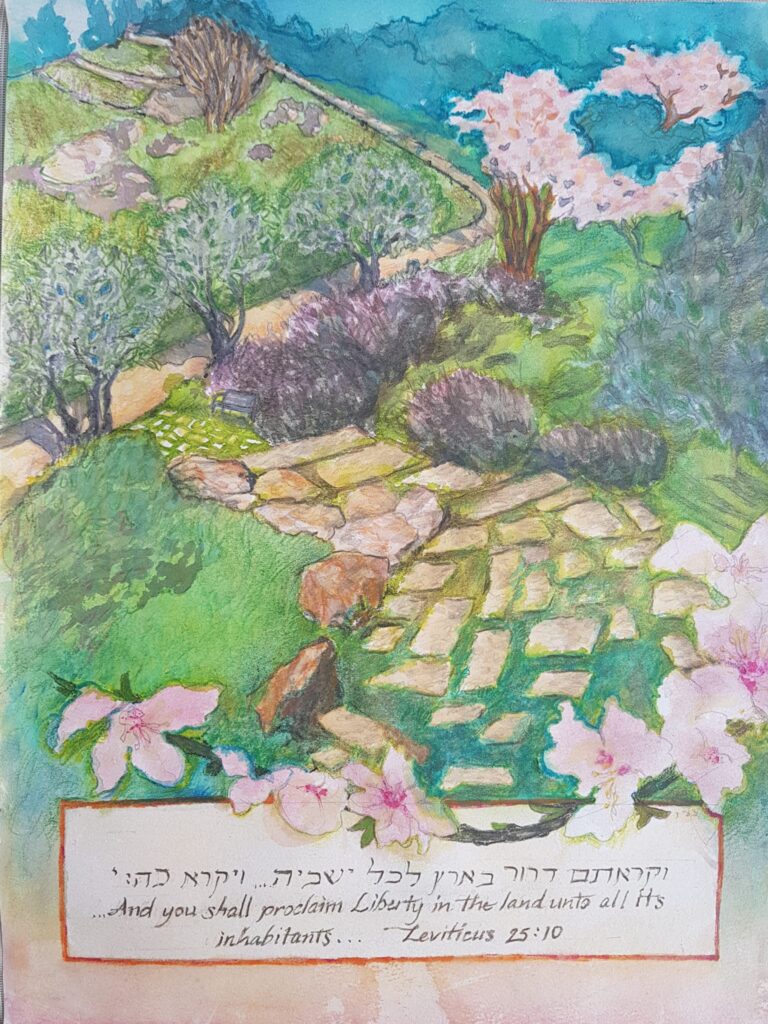In Memoriam: Ester Karen Aida (1967-1922)

When I first met Ester Karen Aida she was still Karen Boxenhorn. She still had her heart. She was still a healthy student in the Shaindy Rudoff Graduate Program in Creative Writing, just like me. The two of us became the first poetry editors for The Ilanot Review, and since Karen was also a visual artist, she designed the initial covers back when we were a print journal.
As we worked towards our graduate degrees, Ester’s heart deteriorated and she became a candidate for a transplant. For months I visited her as she waited in the hospital; in fact, we had our final class in the lounge of the transplant ward at Hadassah. When she ultimately received a donor heart from a Palestinian woman, she became active in “compassionate communication” between Arabs and Jews. Her new name, “Ester Karen Aida”, reflected her new complex physical and emotional life.
On August 9, 2022, during what should have been a simple catheterization procedure, her borrowed heart finally gave out. After fourteen years of physical struggle and intervention, it was both sudden and eerily expected. It was a terrible blow.
Throughout Ester’s work, she draws deeply on her connection to Jewish wisdom and her faith in the Creator of the Universe. “Is it any different with you, God?” she asks in “In The Hart Museum.”
Are we so built in your image
that all you want to do most days is
to lay back in a grassy field and shoot hundreds of snapshots
of us…
Ester’s poems and essays follow the trajectory of ongoing disability, but they also map the soul’s journey through unlikely friendships and the tests of love. She never loses her awareness of how others move through the world alongside her, a journey she describes with tenderness.
In her poem “The Last of Lights,” she reflects:
when a woman says,
I hate you, she means, you hurt me.
I am exhausted, this is why I am like this.
In “Bus Passing the Khan Theater” she ends with the lines:
I can hear in screeches, burps,
expressions of the lungs of babies,
simply, wordless speech, love worth living for.
“Please,” she implores the reader in her poem “Whitmanian Reading at the Barbur Gallery,”
you who’ve heard of the Nazarine,
resurrect our flat and shattered hope …
…I too am never dying, and I bring one perfect sprig
of borrowed verbena to you, to you.
In memory and celebration of a fellow editor, a talented poet, but most of all, a kind and beloved friend, we offer the following poems taken from one of her unpublished manuscripts.
These poems are attentive to the physical landscape of Jerusalem in which they are set, even as they reach toward eternity. The speaker wears her human body lightly, ready to lovingly discard it. It seems fitting that these poems should find their home in our issue on the theme of “Want,” since together we mourn a life cut way too short.
−Jane Medved, The Ilanot Review

Ester Karen Aida, 2022
In the Hart Museum
Ekphrastic on a Photograph
I know from my experience of myself
that I find it almost impossible to feel
my own sense of fullness of choice
when under the influence of the demands of others.
I am a composite flower, petals of your wishes
and a center of my own, do not tear them away from me
with your “loves me- loves me not.”
Is it any different with you, God?
Are we so built in your image
that all you want to do most days is
to lay back in a grassy field and shoot hundreds of snapshots
of us, the same, yet changing a little every moment
In our quantum-physic world because
Thou
Because you see us
like the mirrored facets of a photo he sent,
ether-mail photons,
‘oney-bear in the haart museum, a paw
careful on the gadget the whole hive buzzing
and flashing an iconic portrait of Mom.
Don’t blink or you’ll see it!
*
In the recesses of my black box, my cell-house and calendric room, deep in peat, I beheld your pain.
Show me now, all that refracted light can heal?
Whitmanian Reading at the Barbur Gallery
You are studying seven kinds of obliviousness
in the page of the day at Yeshurun
Still thinking of that reading I make coffee
without the coffee, just stevia and queer hazelnut
powder I’m crazy for and all that steaming water
available in perpetuity
One black tongue curls out of a class
Of perfect sculptures; forty words
like ceramic fish eyes render forth.
Oddly a worn wood head behind it all.
If I look up as Lonnie’s words roll over my ears
every round eye has rooted and spread, now a deep
blinking creature dark in dark plastic.
Perhaps corpses see us back.
A heavy rectangle extends into the space
as if carried by many somber shoulders.
I open to a page we never speak of all evening,
It’s the Nazarine supporting us when we thought
we were dead and did not expect it, the way you
stop counting the kinds of intifadas but mild Beit Jala
and Beit Lechem take the two pans of the scales,
dump them unceremoniously and fill them with loaves.
The room is filled with sonorous waves spilling to the entry,
freshening the air my daughter breathes in the foyer.
-Please, you who’ve heard of the Nazarine,
resurrect our flat and shattered hope,
black dipped with red, a bit of blue, and traces of white ash.
I need your story, my own life in the case of a perfect
fish-eye, I too am never dying and I bring one perfect sprig
of borrowed verbena to you, to you.
In the dragging and delicate morning I am
prepared for the wood bust, it has leafed, wordless,
in the locked gallery.
The Last of Lights (Hanukka 2017)
You can imagine the fabric washes its color
into your body if you try.
I take the train past my stop, to the Central Station,
after the hematologist. I do it obstinately
for I am weary. Try on chenille sweaters in ochre
and magenta, in Hevron there’s a statement
of boycott, but when a woman says,
I hate you, she means, you hurt me.
I am exhausted, this is why I am like this.
Yet the cabbie called up at 8:45 and said
Good morning my darling wife, how are you
then for a three minute call they talked of nothing
and this was the very best of news.
Are you like me? Do you yearn for people
and their color, their patterns, their ostentations
to bring you back to the world after
pain-and-antiseptic? The Christians with their
mind-blowing forgiveness are
turning off diamond Christmas-tree lights
in Bethlehem, and shopkeepers wonder
at their ledgers. In lieu of a pearl it is
Botticelli’s Venus, her gentle face enough
for the Arabic brochure for breast cancer.
Somewhere in a memory
we know a hand on a heart. And that is where the fine
stitches are. I want to shop with Iman, we’ll buy dresses
for both of us embroidered in red thread,
let the black background grow dimmer as we speak.
As practical as strong fabric, but not the wrong way out:
Israelis, Americans, let’s flaunt our need for the material.
Let’s haunt the Arab shops till we drop.
The Kloiz
Spent the day considering
whether I can afford my son’s tuition to the MIT of Jerusalem;
gathering a list of schools
perhaps suiting Ylena’s daughter.
Did the secretary for my nine-year-old’s dance
class———————————————return my call?
In the lightening room I’d dreamed
—I’d gone back to grad school.
—It wasn’t as I had thought, but a scene that I had never known:
In Podolia of the black earth I sat
side-by-side with a youth
tentative as the soft fuzz of my own arm.
He taught me Mishna in the old intonation of the kloiz
before the kloizen were wet with pogroms.
Bus Passing the Khan Theater
you renga me up from a separate star
(yesterday you saw it was dated today)
Most at stake are the children, you say, we
don’t want to crush them in our embrace, like
the angels in Rilke’s Dueno Elegies.
your words shimmer, mute as heat on our bus
where a baby shrieks from her carriage,
Cries relentless as the lurching of the bus,
her mother re-adjusting a pacifier in the pink mouth.
We’re a happenstance village of three
generations yet none of us knows how
to comfort an infant (though the Hasidic
father behind me asks her mother what
I only wonder: do you need some water?)
Can you sense an insistent ramming as
we thrust ourselves forward into the ether
and the future? A mickey-mouse wristwatch
is flattened under a wheeled intelligence
cold as a corpse with a chisel in hand,
chipping a nose in the edge of an ancient
sundial. Clouds in black frames squeeze
downward between brassy-chip towers.
A father nudges forward a boy so
small that each passenger as they entered
overlooked him, not much wider than the door.
He clambers to the seat beside me,
compacts his body in a lump to the seatback.
*
I recall, in the ER, thick constellations,
an orchestral tuning of agony,
and somewhere beyond my head a groaning,
of a grown man as if with an axe,
splitting firewood, or laboring in hard earth.
In the midst of the ill, the sounds were so strangely like
the ones worth living for, the wavering moans of
birthing mothers. And this too is a place
my mind goes to:
ever since, I can hear in screeches, burps,
expressions of the lungs of babies,
simply, wordless speech, love worth living for.
————————–
Quotation from S Patterson, “In Theory,” The BeZine, 2021
